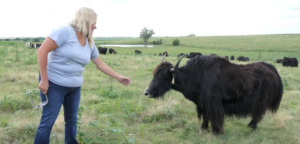As reported in The Hutchinson News: More than two decades ago, Doug David of Lenora, Kansas, wanted to diversify his cattle operation, but he was not sure how he was going to do it.
Then, one day, he went to a show in Colorado and was introduced to a new animal — a yak. He was smitten. For the past 25 years, he has raised the animal, learning as much as he can about its habits and caring for them on ranches in Norton County, Kansas and eastern Colorado.
As of now, he and his wife, Stephanie David, are the largest yak meat supplier in North America. The Davids should know. Stephanie David is president of the International Yak Association Board of Directors.
In addition to Colorado and Kansas, yaks are on ranches in more than a dozen states, including Indiana, Michigan, Montana and Washington. And, according to Stephanie David, the number of yaks in North America is growing.
Yaks, which come from the Himalayas and have long fur that can be used for fiber, enjoy cooler temperatures, especially during breeding season, which for these ranchers is in November and December. That is why, along with their ranch in Kansas, the Davids, who run Bow Creek Ranch, have a cooler area in Colorado for their herd to graze on.
What the Davids have found out about yaks is they like to stick together and socialize, and they are easily domesticated.
“If you mess with them when they are little, they are more docile than cows,” Stephanie David said. “They are really loyal once you get them tamed.”
And, according to Doug David, their meat has a sweeter flavor than beef.
“It’s 90% lean,” he said. “It’s the lowest red meat in cholesterol value.”
With more than 200 yaks who graze on more than 400 acres, the Davids keep busy with their herds. In addition to raising the animal for meat, they also send the yaks’ cashmere-like fiber off to Shepherd’s Mill in Phillipsburg to be processed and spun. The wool, which can be used for knitting, has no lanolin, making it a great alternative to sheep’s wool.
Although they look larger, the yak, Doug David said, has a smaller hanging carcass, with about 1/3 the meat of a beef cow. Yaks can also be milked.
“Yaks will have (little ones) until they are 20 years or so,” Doug David said. “They will live to be about 25 to 28 years old.”
Along with selling yak meat, fiber and hand-crafted goods, the Davids sell starter herds and help people understand the animal. They recently helped a rancher in Salina and one in Norton County start their own herds.
In addition to selling to a major distributor, the Davids also sell directly to the consumer — more than 2,500 pounds a month, and at a few markets around Kansas. They said their yak meat can also be found at Natural Grocers in Wichita.
When it was perceived that meat was scarce when COVID-19 hit, the Davids ramped up their production of yak, beef and pork.
“It’s slowed down a little, but we’ve still been pretty steady,” Stephanie David said. “Our customer base has stayed loyal.”
The Davids also raise a rare pig, the Mangalitsa. This Hungarian breed of domestic pig has a thick, curly coat of hair on its back.
“Their meat is fatty and is real marbly,” Doug David said.
Some of the Davids’ registered yak herd have become pets. All those animals have names.
“They make a great pet,” Stephanie David said. “They can be like a dog.”
But working them requires patience, Doug David said. “You’ve got to take your time. They’re clannish, and they have a good memory.”




